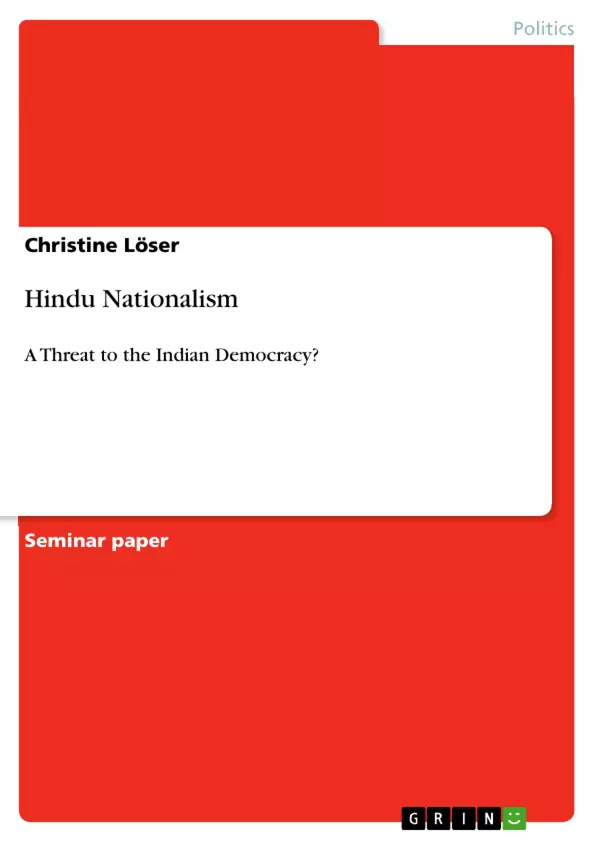This essay addresses the question whether Hindu nationalism is a threat to democracy or not and if so in what sense it has threatened democracy.
The question is why this topic is so relevant. Every now and then we hear about violent riots in India, read it in the papers or watch it in the TV news. Many times these riots are caused by different religious groups: on the one hand Hindus, on the other hand minorities, mostly Muslims, Sikhs or Christians. A reason for this is the rise of a Hindu right. The phenomenon of Hindu nationalism has already been discussed in research for some time, but only in the past few years, a discussion outside India has begun whether or not it might be a threat to the biggest democracy in the world. The public in the Western hemisphere is probably completely ignorant about this topic, especially as Islamism has threatened the Europeans and Americans a lot more. Another aspect is that a lot can be learnt about how religious nationalism can threaten democracy.
So, why is Hindu nationalism such an interesting subject now? It is due to the fact that Hindu religion is such an important aspect, mainly the base, of this nationalism since common religion is admittedly many times part of a nation’s roots according to scholars but usually not defined as the boundary for what is inside. Additionally, the idea of a Hindu community is a perfect example of the European idea of nationalism brought to a (former) colony.
This essay is structured in the following way: First of all, the theoretical fundamentals are laid by explaining what “nationalism” and a “nation” is. It then proceeds by describing the Indian democracy based on its Constitution and the Congress System, both playing an important role in the rise of Hindu nationalism. The essay then refers to Hindu nationalism itself, portraying its historical development in the 20th century, illustrating the ideological basis with the concepts of Savarkar and Golwalkar on which it is based and the actors of Hindu nationalism on the level of the state. This is followed by an analysis of the influence of Hindu nationalism on the Indian democracy. The paper finishes with a conclusion.
Inhaltsverzeichnis (Table of Contents)
- Introduction
- Theoretical Fundamentals
- Nationalism
- Nation
- Indian Democracy
- Constitution
- Congress System
- Hindu Nationalism
- The Actors
- Sangh Parivar
- Rashtriya Swayamsevak Sangh (RSS)
- Bharatiya Janata Party (BJP)
- Sangh Parivar
- The Ideological Fundamentals of the Hindu Right
- Hindutva
- Further Development
- The Actors
- The Influence of Hindu Nationalism on the Indian Democracy
- Conclusion
Zielsetzung und Themenschwerpunkte (Objectives and Key Themes)
This essay investigates the relationship between Hindu nationalism and Indian democracy, specifically analyzing whether and how Hindu nationalism poses a threat to the democratic system in India. The essay aims to provide a comprehensive understanding of the rise of Hindu nationalism in India, examining its historical development, ideological underpinnings, and influential actors. It also aims to assess the impact of this ideology on the functioning of the Indian democracy.
- The historical development of Hindu nationalism in the 20th century
- The ideological foundations of Hindu nationalism, particularly the concepts of Savarkar and Golwalkar
- The role of key actors within the Hindu nationalist movement, including the Sangh Parivar organizations like the RSS and BJP
- The influence of Hindu nationalism on the Indian democracy, examining its impact on various aspects of the political and social landscape
- The complexities of Hindu nationalism as a potential threat to democratic principles and values
Zusammenfassung der Kapitel (Chapter Summaries)
The essay begins by defining the concepts of "nationalism" and "nation," providing a theoretical framework for understanding the rise of Hindu nationalism. It then explores the structure of the Indian democracy, focusing on its Constitution and the Congress System, as important contexts for understanding the rise of this ideology. The essay then delves into the history and ideology of Hindu nationalism, highlighting the influential figures and organizations that have shaped its development. It analyzes the key concepts and ideas that underpin this movement, such as Hindutva, which emphasizes the cultural and religious unity of India.
Schlüsselwörter (Keywords)
This work explores the relationship between Hindu nationalism and Indian democracy, focusing on the themes of nationalism, nation, democracy, Hindu identity, Hindutva, the Sangh Parivar, the RSS, the BJP, and the impact of religious ideologies on political systems. The essay examines the evolution of these concepts within the Indian context and their potential influence on the stability of the Indian democracy.
Frequently Asked Questions
Is Hindu nationalism a threat to Indian democracy?
The essay explores this complex question, analyzing how religious nationalism can challenge democratic principles and minority rights.
What is "Hindutva"?
Hindutva is the ideological basis of the Hindu right, emphasizing the cultural and religious unity of India as a Hindu nation.
Who are the main actors in Hindu nationalism?
Key organizations include the Sangh Parivar, specifically the RSS (Rashtriya Swayamsevak Sangh) and the BJP (Bharatiya Janata Party).
Whose ideological concepts founded the movement?
The movement is largely based on the concepts developed by V.D. Savarkar and M.S. Golwalkar in the 20th century.
How does Hindu nationalism affect the Indian Constitution?
The essay discusses the tension between the secular principles of the Indian Constitution and the religious-nationalist goals of the Hindu right.
Why is this topic relevant to Western audiences?
It provides insights into how religious nationalism can transform the world's largest democracy and the global implications of such shifts.
- Arbeit zitieren
- Christine Löser (Autor:in), 2011, Hindu Nationalism, München, GRIN Verlag, https://www.grin.com/document/171917



